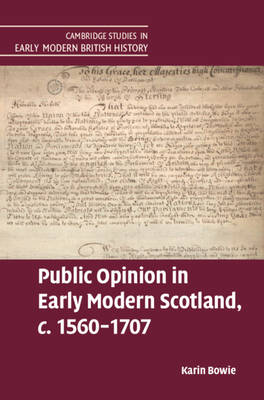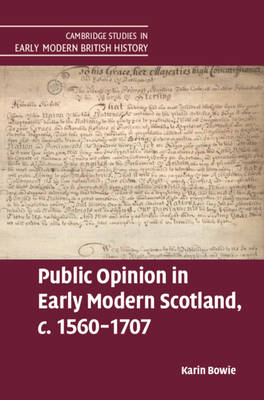
- Afhalen na 1 uur in een winkel met voorraad
- Gratis thuislevering in België vanaf € 30
- Ruim aanbod met 7 miljoen producten
- Afhalen na 1 uur in een winkel met voorraad
- Gratis thuislevering in België vanaf € 30
- Ruim aanbod met 7 miljoen producten
Zoeken
Omschrijving
In early modern Scotland, religious and constitutional tensions created by Protestant reform and regal union stimulated the expression and regulation of opinion at large. Karin Bowie explores the rising prominence and changing dynamics of Scottish opinion politics in this tumultuous period. Assessing protestations, petitions, oaths, and oral and written modes of public communication, she addresses major debates on the fitness of the Habermasian model of the public sphere. This study provides a historicised understanding of early modern public opinion, investigating how the crown and its opponents sought to shape opinion at large; the forms and language in which collective opinions were represented; and the difference this made to political outcomes. Focusing on modes of persuasive communication, it reveals the reworking of traditional vehicles into powerful tools for public resistance, allowing contemporaries to recognise collective opinion outside authorised assemblies and encouraging state efforts to control seemingly dangerous opinions.
Specificaties
Betrokkenen
- Auteur(s):
- Uitgeverij:
Inhoud
- Aantal bladzijden:
- 320
- Taal:
- Engels
- Reeks:
Eigenschappen
- Productcode (EAN):
- 9781108843478
- Verschijningsdatum:
- 17/12/2020
- Uitvoering:
- Hardcover
- Formaat:
- Genaaid
- Afmetingen:
- 152 mm x 229 mm
- Gewicht:
- 576 g

Alleen bij Standaard Boekhandel
+ 296 punten op je klantenkaart van Standaard Boekhandel
Beoordelingen
We publiceren alleen reviews die voldoen aan de voorwaarden voor reviews. Bekijk onze voorwaarden voor reviews.











